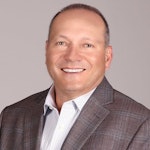When a client hired me to do a presentation on storytelling, I hesitated for a moment (a rarity for me) before accepting the opportunity. I asked myself, What do I know about this sales technique that has recently become a favorite buzzword among sales gurus?
As I did my research, I realized that I have been storytelling for years and that storytelling is utilized by all elite sales reps in the course of doing business. If you're in sales and aren’t storytelling, focusing on this technique is a great New Year’s resolution.
What is storytelling?
Storytelling is a communication style that is designed to create interest, to promote empathy and to enhance audience engagement. The science behind storytelling suggests that storytelling stimulates seven areas of the brain while basic information stimulates only two areas. I know that, because I read it on the internet.
A storytelling experiment
Let’s say you want to establish the credibility of your coffee service company with a prospect.
Approach #1:
- We’ve been in business for 25 years.
- I started the company because I wanted to bring better coffee to the office.
- We now have 100 employees.
- We have 2,500 clients and 3,000 products.
- We serve the tri-county area.
- We have 10 different roasts.
- We offer fresh drinking water systems.
- We can also help you with your vending or even a micro market.
Approach #2:
- Twenty-five years ago, I had an idea and was at a crossroads. The idea was to bring bean store quality coffee to the workplace and provide a concierge level of service. The crossroads related to a tough decision to diversify from vending and go into the coffee business to make this dream, this idea, a reality.
- My partner and I took day trips to visit roasters in San Francisco and Seattle, trying to find one that would do a private label for us. Of course, everyone asked me the same question: “How much volume are you doing?” Our answer was, “Zero, but we plan to do quite a bit.” The roasters usually showed us the door.
- Finally, we found a roaster in Oakland who was willing to take a chance on us. We spent a couple of days coffee cupping and developing three coffees, which we still sell today. Our Vienna Roast, 100% Colombian and Vienna Roast Decaf were an instant success.
- Five years into business we had 500 accounts. Today, we have 2,500 clients and 25 coffees. But no matter how large we get, we are still committed to the original idea: To bring bean store quality coffee to the workplace and provide a concierge level of service.
Did you feel the difference in your brain?
Science aside, approach #2 is obviously far more engaging. Storytelling is about more than just your company history. Elite sales reps are equipped with an arsenal of stories that can energize their sales presentations, but only when they are properly deployed.
Storytelling fundamentals
Any story you tell must be true (slightly embellished is OK). There also needs to be a:
- Main character
- Beginning
- Middle
- Ending
It is also important that the story be engaging. A boring story is still boring. A story about your company history should also be known company-wide. Your route driver should not look perplexed when a client says, “Man, the way your company got started — that’s quite a story.”
“Research” — the first key to storytelling
Storytelling requires preparation. It needs to be part of a sales rep’s game plan once they have the answers to some key questions:
- What does the prospect’s company do?
- Do we have any common LinkedIn connections?
- What do we know about their corporate culture? Is it philanthropic? Employee-centric?
- Who am I dealing with? Gen Z? Millennial? Gen X? A rare Boomer?
- What did I learn from the initial conversation
What you know prior to an appointment will help you choose a compelling story.
“Relevance" — the second key to storytelling
“One size fits all” does not apply to storytelling. Tell a story that is relevant and driven by what you see, the answers to the questions you have asked the prospect and the point you are trying to make.
A real-life story — amenity gone wrong
A few years ago, I was on an OCS appointment and while doing a walk-through with Susan, the office manager, I saw cases of beverages from Costco, torn apart, all over the kitchen floor — it was a real mess. The refrigerator was jammed with soda cans shoved in every available spot.
I could have said to Susan:
“Nice that you give free beverages away, but what a mess you have on your hands.”
Instead, I mentioned that I thought it was great that free beverages were being provided for the employees. I added that one of her LinkedIn connections, Jane at Lord Johnson and Company, was ordering beverages from Costco just like Susan is now, offering the same amenity, but switched to my company when we offered Jane a glass door cooler, weekly delivery and product rotation as part of a total refreshment management program. Jane loves the fact that it frees up refrigerator space and really enhances the amenity.
Ultimately, Susan suggested that we add that to the proposal and of course, we took the business away from Costco and sales increased by 40%. Good story, good result.
An arsenal of story ideas
Consider some other true stories that can make an impact (engage) and drive home a point:
- Copper tubing is far superior to plastic: The overnight flood story.
- The importance of leak detection equipment: The overnight flood story, again.
- Choosing the right coffee: The story about the entire office that was walking to the local coffee house at break time.
- Why a thoughtful design works in a micro market: The success story about a client that now has a break room that brings employees together.
- Why vendor consolidation makes sense: The story about your client who discovered the ease and value of ordering all refreshment services from one company.
The moral of the story
Elite sales reps have an arsenal of stories prepared, each designed to deal with a specific scenario. In those quiet days in the office before the start of 2020, when you can’t reach anyone by phone, sales reps should spend some time crafting their stories for the year to come. Learning to tell engaging and relevant stories will make for a very prosperous New Year.
I would love to hear some of your stories. Drop me a note at [email protected].
Industry consultant Bob Tullio (www.tullioB2B.com) is a content specialist who advises operators in the convenience services industry on how to build a successful business from the ground up. As he is a recognized industry expert in business development and sales, NAMA has hired him to write and narrate its new online course, “Selling Convenience Services,” to be released in early 2020. At the 2020 NAMA Show in Nashville, Tullio is scheduled to present a pre-conference session, “Selling Convenience Services – A Business Development Playbook for Management” and an additional one-hour general education session, “Organic Business Development for Sales Reps – 5 Strategies.”

Bob Tullio
Bob Tullio is a content specialist, speaker, sales trainer, consultant and contributing editor of Automatic Merchandiser and VendingMarketWatch.com. He advises entrepreneurs on how to build a successful business from the ground up. He specializes in helping suppliers connect with operators in the convenience services industry — coffee service, vending, micro markets and pantry service specifically. He can be reached at 818-261-1758 and [email protected]. Tullio welcomes your feedback.
Subscribe to Automatic Merchandiser’s new podcast, Vending & OCS Nation, which Tullio hosts. Each episode is designed to make your business more profitable.





